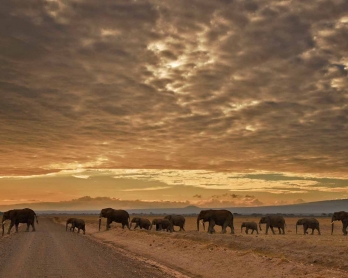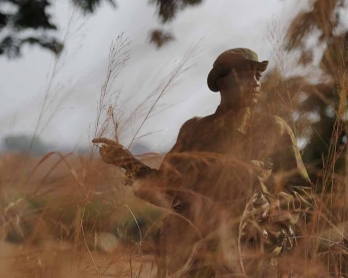The last chimp standing
Grand-Lahou, Ivory Coast -- The plan was just to escape the infernal noise and traffic jams of Abidjan, the coastal megalopolis in the south of the Ivory Coast. And then I met Ponso, the last resident of “Chimp Island.”
 (AFP / Issouf Sanogo)
(AFP / Issouf Sanogo)For my vacation, I headed to Grand-Lahou, a small island in the Atlantic that to me seemed an ideal place to wash away the stress, in waters that were calmer and on beaches that were less crowded than the Grand-Bassam popular resort near Abidjan. An added plus for a history buff like me -- I could also visit the old “Lahou” where white missionaries disembarked in 1920 in an effort to convert the locals.
I eventually arrived at “The Ravin,” a hotel owned and run by Francoise Stephenson, a Franco-American who settled here in 1990. The 60-something came here on vacation, fell in love with the place and never left. She has a role to play in the story of Ponso, too.
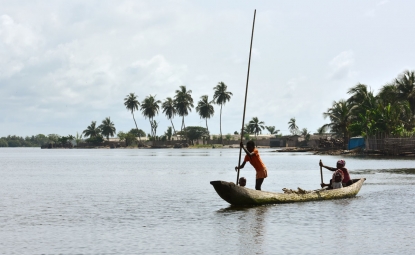 The Bandama river near Grand-Lahou.
(AFP / Issouf Sanogo)
The Bandama river near Grand-Lahou.
(AFP / Issouf Sanogo)Eventually I make my way to a village on the other side of the lagoon with the aim of wandering the beach, collecting seashells and remnants of 1940s porcelain vases spit out by the sea, and gazing at remnants of old colonial houses.
As I wander, I see an old wooden sign “Chimp Island” nailed to a small shack, with an arrow pointing the way.
Intrigued, I follow the direction of the arrow to arrive at a dead end by the side of a river. I see nothing but an abandoned food shack made of straw by the side of a house.
A cry pierces the silence.
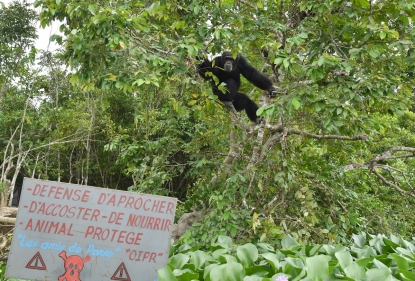 (AFP / Issouf Sanogo)
(AFP / Issouf Sanogo)I look in its direction, a small island a few dozen meters away. There, I see an enormous chimpanzee and a man of around 20. The two are goofing around like old friends, oblivious to the world.
I watch, first just fascinated by the unexpected spectacle. Then journalistic curiosity begins to creep in -- who is this man, who is this chimp, what are they doing, how did they get here? The questions bubble up as I wait for the young man to return from the island.
His name is Junior and his father, 60-year-old Germain Djenemaya Koidja, tells me the story of the magnificent primate.
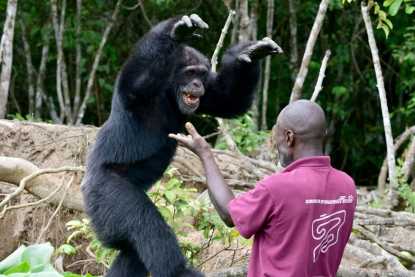 Germain and Ponso hang out.
(AFP / Issouf Sanogo)
Germain and Ponso hang out.
(AFP / Issouf Sanogo)He was one of some 20 chimps who arrived here in 1993 from Liberia, to be used in cancer experiments. Over the years, they adapted to their new home, where they weren’t bothered by humans.
Germain’s father, a fisherman, took care of them when they first got to the island.
As Germain speaks, I get the feeling that I’ve heard the story before. I call Issouf Sanogo, my photographer colleague, who jolts my memory. In the 1990s we did a story on the Azagny national park that lies next to “Chimp Island.” Helped by park rangers, we even came close to the island in canoes. Issouf is surprised that there is only one chimp left from the group that inhabited the island back them.
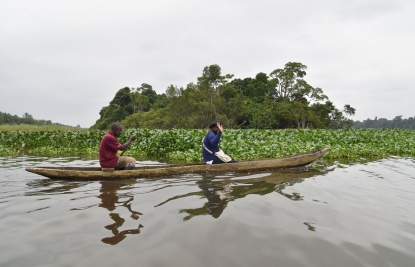 Arriving on Chimp Island.
(AFP / Issouf Sanogo)
Arriving on Chimp Island.
(AFP / Issouf Sanogo)Over the years, the chimps gradually died one by one, despite the care from Germain’s father. Often the deaths were unexplained. Among the suspects were bites from snakes, which infest this inhospitable forest, or poachers after their fur, which is prised by many Ivorians.
There were four chimps left in 2010, when Germain’s father died. Germain, who was trained in the care of the animals, took over in looking after them. Then in 2015, three chimps died, leaving one lonely survivor -- Ponso.
Ponso took the death of his family hard. For three days, he refused to eat or to see anyone, keeping to himself.
As I listened to the tale, I thought how representative it was of the chimps’ decline as a whole in Ivory Coast, which at one time boasted Africa’s largest population of these magnificent primates.
In 2002, there were more than 15,000 chimps estimated to live in the tropical forests between Ivory Coast and Liberia. Over the past few years, that number has plummeted to “less than 1,000” according to conservationists.
Part of the reason for the decline was Liberia’s civil war, which lasted from 1989 to 2002, killed an estimated 250,000 people, and led to a rise in poaching and the destruction of the chimps’ natural habitat.
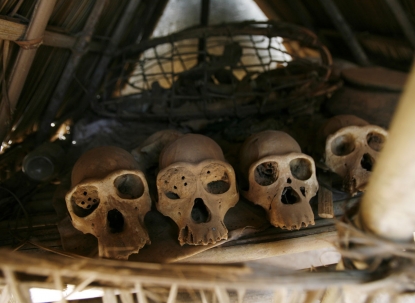 Chimpanzee skulls are displayed at the home of a family that worships chimps, like many Ivorians, in the village of Douably, March, 2008, in Tai National Park.
(AFP / Kambou Sia)
Chimpanzee skulls are displayed at the home of a family that worships chimps, like many Ivorians, in the village of Douably, March, 2008, in Tai National Park.
(AFP / Kambou Sia)When I got back to the hotel, Francoise Stephenson told me her part in Ponso’s tale. When he was left alone, she worked hard and eventually got two chimps to be transferred to the island from a natural park in the west of the country, so that he would have company. But the good intention went awry. Ponso did not accept the newcomers and killed them.
Francoise refused to be discouraged by the incident. She contacted a famed French veterinarian, Estelle Ramada, who worked with Germain to allow Ponso to live happily on the island despite his solitude.
Two weeks later, I return to Grand Lahou, this time as a journalist and with my photographer and video colleagues, to do a proper story on Ponso.
Interviewing Germain was one thing, but filming Ponso was something else. We had to approach the island in a canoe… with most of us not knowing how to swim (like most of Ivorians).
 (AFP / Issouf Sanogo)
(AFP / Issouf Sanogo)When Ponso broke off a branch, the noise made Evelyne Aka, our video journalist, jump, setting the canoe tipping from side to side. “I had the scare of my life,” Evelyne would say later. Apparently the deadly post-election violence that she covered in 2010-2011 wasn’t as scary.
It didn’t take long to fall in love with Ponso. It was sad to see him all alone in the luxurious greenery. I also understood that this primate, who shares 90 percent of genes with humans, is an animal that needs tenderness, love and care.
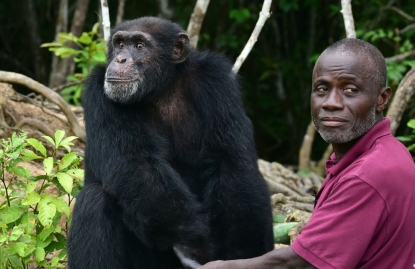 (AFP / Issouf Sanogo)
(AFP / Issouf Sanogo)



